- Home
- Carol Higgins Clark
Jinxed
Jinxed Read online
ALSO BY CAROL HIGGINS CLARK
He Sees You When You're Sleeping
(with Mary Higgins Clark)
Fleeced
Deck the Halls
(with Mary Higgins Clark)
Twanged
Iced
Snagged
Decked
CAROL
HIGGINS CLARK
JINXED
SCRIBNER New York London Toronto Sydney Singapore
SCRIBNER
1230 Avenue of the Americas
New York, NY 10020
This book is a work of fiction. Names, characters, places, and incidents either are products of the author's imagination or are used fictitiously. Any resemblance to actual events or locales or persons, living or dead, is entirely coincidental.
Copyright © 2002 by Carol Higgins Clark
All rights reserved, including the right of
reproduction in whole or in part in any form.
SCRIBNER and design are trademarks of
Macmillan Library Reference USA, Inc., used under license
by Simon & Schuster, the publisher of this work.
ISBN 0-7432-4673-X
Visit us on the World Wide Web:
http://www.SimonSays.com
Acknowledgments
I would like to thank the following people who were so helpful to me as I wrote this book.
First and foremost, my editor, Roz Lippel, who is such a pleasure to work with and a great adviser and sounding board. Roz's assistant, Laura Petermann, was ever helpful. Special thanks to Michael Korda and Chuck Adams for their guidance. A cheer for my publicist, Lisl Cade, who, as always, is right there for me. Thanks to my agent, Nick Ellison, and my foreign rights director, Alicka Pistek.
Art director John Fulbrook has once again done a terrific job as has associate director of copyediting Gypsy da Silva. Also, a special nod to the memory of copyeditor Carol Catt. And as always thanks, Mom! My mother, Mary Higgins Clark, is always at the other end of the phone when I need encouragement!
Finally, thanks to my family and friends who are always asking, “How's it going?”
Now I can play!
In memory of my grandmothers,
Nora Cecelia Higgins and Alma Claire Clark,
with joy and love!
Thursday, May 9
1
Turn right at the bumpy dirt road,” Regan Reilly instructed her beau, Jack “no relation” Reilly. He was at the wheel of her Lexus, and they were heading to the last winery on their tour of the Napa Valley and Santa Barbara County. Regan was reading from a guidebook.
“This bumpy dirt road?” Jack asked as he made the turn and the car started to bounce along, stirring up a cloud of dust in its wake.
Regan smiled. “I don't see any others.”
“I can just imagine what this place is going to be like,” Jack mused. “With a name like ‘Altered States’ and this out-of-the-way location . . .”
“They say it's the perfect place to relax, sip a glass of wine, meditate, sleep in the charming bed-and-breakfast . . . get away from it all, and leave your stress behind.”
“Well, they were right when they said we were getting away from it all.” Jack reached over and squeezed Regan's hand. “This place is way off the beaten track. And in the last week we've been to some remote spots.”
Regan and Jack had met five months ago in New York when Regan's father, Luke, was kidnapped at Christmastime. Jack, the head of the Major Case Squad in Manhattan, had been instrumental in finding Luke.
Luke was returned safely on Christmas Eve. Regan and Jack's romance began that night. Perhaps an odd way for two people to meet, yet Luke claimed full credit and protested that he had not yet been paid his Dolly Levi commission. He and Regan's mother, suspense writer Nora Regan Reilly, were convinced that Jack was Regan's perfect match. Not only was thirty-four-year-old Jack handsome, nice, and smart, with a wry sense of humor, but he also was a go-getter. A graduate of Boston College, he had two master's degrees, and his goal was to become police commissioner of New York. Few who knew him doubted he would make it.
Now they were finishing up their first vacation together, a driving tour that took them north from Los Angeles, up the Pacific Coast Highway, and across to the Napa Valley wine country, then back down through the valleys. Altered States was their last stop before heading back to Los Angeles where thirty-one-year-old Regan worked as a private investigator.
The trip had been great. They'd walked the beach, stopped in little coastal towns, and discovered restaurants that were full of charm and good food. Even the characters in a couple of roadside dumps they'd stumbled upon provided a lot of laughs.
“You know,” Jack said, smiling, “we haven't gotten on each other's nerves even once.”
“What a miracle.” Regan laughed as she glanced at his profile. God, is he good-looking, she thought. And he makes me so happy. He was 6 feet 2 inches tall, broad-shouldered, with sandy brown hair that tended to curl, strong even features, and hazel eyes. He was the perfect complement to Regan, who had inherited Black Irish looks from the Reilly side of her family. She had raven black hair, light skin, and blue eyes.
“This is the bumpy dirt road to end all bumpy dirt roads.” Jack navigated the car down the seemingly endless stretch. It was almost five o'clock. They had been driving for hours and were looking forward to getting out of the car and having a glass of wine on the back deck of the inn that supposedly had a great panoramic view.
In the distance, they saw a cluster of old wooden and stone buildings, surrounded by acres and acres of vineyards. Regan whispered, “It does have the feeling of an old ghost town, just as the guidebook promised.”
“This place was abandoned for decades, right?” Jack asked.
“Yes. Prohibition put the winery out of business, and then it stood idle for years. A couple bought it and started renovations, but then they went bankrupt. The new owners haven't had it for long at all.”
They drove slowly through a lemon grove and into the open space in front of the main building. Jack stopped the car. They got out, and each took a deep breath of the fragrant air.
“It's so peaceful and quiet,” Regan said.
Jack's cell phone rang. “You were saying,” he remarked as he winked at her, pulled open his phone, and answered it. Regan could tell right away from the tone of his voice that it was his office calling. She slowly walked over to the large stone building and stepped inside the main entrance.
“Hello there.” A tall, thin woman greeted Regan quietly from behind a massive reception desk. Numerous candles flickered on a shelf behind the desk. The woman looked about fifty and had flowing blond hair streaked with gray that gave her an ethereal quality. “We're so glad to have you here at Altered States.”
This certainly feels like Altered States, Regan thought, but she said, “Thank you. It's nice to be here.”
“Do you have a reservation?”
“Yes, we do.”
“Wonderful. Please sign our guest book. Where are you from?”
“Los Angeles.”
“That's great. Do you have a business card? We'd like to make sure you're on our mailing list.”
Regan pulled a card from her wallet and handed it to the woman.
The woman stared at it for a moment, then looked up at Regan with a Zen-like expression. “You're a private investigator?”
Regan nodded. “Yes.”
“How neat,” she said. “That is really neat.”
“Oh, it's neat all right,” Regan agreed and laughed. She could hear the door behind her open. She turned, already smiling, praying it would be Jack. This woman was just a little odd. Her prayers were answered, but Jack was not looking as relaxed as he had a few minutes before.
�
��I'm sorry, Regan. I have to get back to New York tomorrow. That case I told you about . . .”
Regan felt a stab of acute disappointment. “Oh, Jack, that means our vacation's over,” she said with a look of mock horror.
“I know. I feel terrible. We should probably go down to Los Angeles tonight.”
The woman behind the desk looked sympathetic. “We'll be happy to honor your reservation another time. We'd just love to have you come back and visit.”
“We'd love to come back,” Jack and Regan replied in unison, as a black cat jumped up on the desk.
None of them had any clue that Regan would be returning in less than twenty-four hours.
2
Lucretia Standish pushed the “help” button on her night table for the third time since she'd awakened in her sumptuous bedroom in Beverly Hills. She hadn't lived in the house long and still got a kick out of pushing the button vigorously every time a thought crossed her mind that might require feedback from the maid. The maid, making a concerted effort not to go mad, longed for her old employer, who died as she had lived, peacefully, only three months before. The house had been sold, furniture included, to Lucretia.
Lucretia was ninety-three years old and had no time to waste on decorating. “It takes years to get it right. You put something on order, and it takes forever. I haven't got forever. I like this place as is. I want to buy the whole kit and caboodle.”
“But the family might not want—” the real estate agent had protested.
“I'm making an offer. Take it or leave it.”
The next of kin were only too happy not to have to deal with a full-blown garage sale.
The house was perfect for Lucretia. It was elegant yet comfortable, a ranch with a large garden and pool. Everything in the bedroom, from the plush carpeting to the silk curtains to the fluffy quilt and dozens of decorative pillows, was done in shades of peach—tones and textures that were designed to soothe. A big job for these inanimate objects; some might say impossible. Lucretia could be a handful.
She had done a lot of living in her ninety-three years. Her father had owned a winery that went out of business, thanks to Prohibition. When she was a teenager, Lucretia moved to Hollywood where she became a promising young actress in silent films. She was just starting to get famous when they began making talkies. Lo and behold, Lucretia's screechy voice killed any hope of a transition. Then the stock market crashed on her birthday.
“Timing is everything,” Lucretia would say. “And mine often stinks. The 1920s were not so roaring for my family.” Then, with a mischievous smile, she'd always add, “But the last seventy years haven't been bad.” Her optimism about life never flagged.
Lucretia had married five times, traveled around the world, and lived on three continents. When her last husband, Haskell Weldon, died while playing bingo on a world cruise, Lucretia returned to their apartment in New York City. A young man she met at a party told her he had a hot investment tip.
“There's a new dot-com that's going to go through the roof,” he whispered. “If I were you, I'd invest every penny I could spare.”
“What's a dot-com?” she asked.
Thirteen glorious months later, believing that nothing good lasts forever, Lucretia cashed out, just before the company went belly-up. With nearly $60 million in her bank account, she decided to sell the New York apartment and move back to California where the weather was better. Driving around Beverly Hills on her first Sunday back, she noticed that the house she had always admired when she was a young actress with stars in her eyes had a FOR SALE sign in front of it—OPEN HOUSE TODAY.
“It's meant to be,” she cried, jumping out of the car and running inside. Lucretia wasted no time in making an offer.
“I had my heart set on this place over seventy years ago. I might be a little old to have the wild parties I would have had if things had worked out back then, but now I'm living my dream!” she explained to the real estate agent. Two weeks later the house was hers.
Lucretia pushed the button again, and the maid hurried into the room. “Yes, Miss Lucretia.”
“Phyllis, why isn't Edward here yet?” Lucretia asked a trifle impatiently. Although Lucretia's voice had stopped her acting career dead in its tracks, at ninety-three she still sounded surprisingly strong and snappy. She was a tiny little thing with wispy strawberry-colored hair and delicate features. Her skin was creamy and taut, thanks to genetics and an occasional nip and tuck. It was easy to see why the camera had loved her. Too bad the same couldn't be said about the microphone. There was no romance there. It only brought out the worst in her.
“Beats me.” Phyllis, a woman in her early sixties, did not waste words. Her passion was game shows, and she had appeared as a contestant on several over the years. She was a stocky woman with a bulldog face and drooping lower lip that gave her a mournful expression.
Lucretia shrugged. “Me, too.” She knew it was a silly question. Edward wasn't due for another ten minutes. “I'll go sit at the table on the patio. Send him out there as soon as he arrives.”
“Of course.” Phyllis hurried back to the kitchen where, on the miniature television set on the counter, a contestant was about to play for big money.
Eight minutes later, Edward Fields pulled up the driveway in his BMW. Lucretia had phoned him very early and said she needed to talk. She had made a lot of money thanks to Edward's hot tip, and she trusted him. That was good, he thought. He needed her. He was now managing her money, and she was his only game in town. He had followed her from New York to California.
Forty-six years old, he had a carefully cultivated nerdy appearance. Three old ladies ago, he realized that what worked best was to look like a cross between a benevolent church usher and a scrupulous accountant, someone who cared about your welfare and your bank account. Short, gelled brown hair parted in a razor-sharp line and a perpetually earnest expression emanating from sad brown eyes behind horn-rimmed glasses did the trick.
Edward parked the car, pulled his briefcase off the seat next to him, and opened the door. His thin frame was clothed in a conservative gray suit. A white shirt and black bow tie completed the outfit.
“She's out back,” Phyllis announced curtly when she answered the door, nodding toward the pool.
“Thank you, ma'am,” Edward replied with exaggerated politeness. He hated to admit that he was a little afraid of her. She had Lucretia's ear when he wasn't around, and he had the feeling that she saw through him. Kill the enemy with kindness, he thought every time he laid eyes on her bulldog face.
He found Lucretia at a table by the swimming pool. Clad in a multicolored caftan, she was sitting under a pink umbrella sipping pink lemonade.
“Darling!” she cried when she saw him. “Lucretia.” He leaned down to kiss her cheek, stood up, and looked around. “I can't get over how much I love it back here. This is so perfect for you. I'm so glad you were able to finally own this house.”
What he was trying to get to run through her mind once again was that it was all thanks to him. He did this as often as possible, walking a fine line between subtlety and hitting her over the head.
“I love it, too,” Lucretia said excitedly as she admired the glistening water sprinkled with floating striped beach balls, the lush manicured yard, and the little pool house painted a perky pink to match the umbrella. “And I've decided it's time I had a party.”
“That's a great idea!” Edward said, thinking of who he would invite. Who he needed to impress.
“A family party,” Lucretia added. “That's what I wanted to talk to you about today.”
“Family party?” Edward looked surprised. He'd never met any of her family. He didn't think she had any living relatives. For some reason he was starting to sweat.
“My dear Haskell had a niece, two nephews, and one grandniece. They all live in California. I want to connect with them.”
The children of her late husband's brother were “hippie types,” she explained. They all looked for an inner p
eace that didn't come from soothing peach bed pillows. Just before Haskell died, they purchased an old ghost winery. It had been abandoned for years after Prohibition. The previous owners had gone bankrupt, and the three siblings bought it for a song. Their plan was to add a meditation center, a spa, and a candle shop. They had called Haskell for advice, and he told them to go for it. “Think big,” he preached. “That's why I was a success.”
They hadn't been too happy when their uncle told them two years earlier that he was marrying Lucretia. He'd known her so briefly. Lucretia and Haskell married in Europe, lived in New York, and spent most of their two-year union on cruise ships, so Lucretia had never met Haskell's family. A get-together was just being planned when a strenuous game of bingo did him in.
“Why do you want to connect with them?” Edward asked, his voice almost squeaking. God, he thought, I don't need family members getting in the way.
“Because I want them to be at our wedding,” Lucretia answered, smiling up at him. “I've decided to accept your proposal.”
Edward grabbed Lucretia's fragile little hand and brought it to his lips. “My love,” he whispered. “I'm overwhelmed. I never thought you would—”
“I didn't, either,” Lucretia admitted. “But you've been so wonderful to me. I must say that when I was younger, you wouldn't have been my type. Quite frankly, I preferred men who were dashing and exciting. But now that I'm more mature, I realize how important it is to have someone who is serious and caring and concerned—”
“I am those and more,” he managed to croak, slightly insulted yet glad that his act had gone over so well. “Why don't we just elope today?”

 Regan Reilly Boxed Set 1
Regan Reilly Boxed Set 1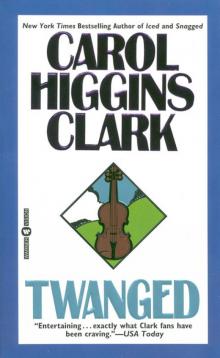 Twanged
Twanged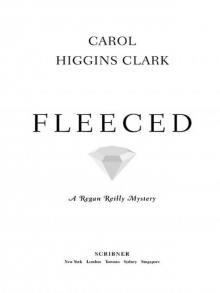 Fleeced: A Regan Reilly Mystery
Fleeced: A Regan Reilly Mystery Iced
Iced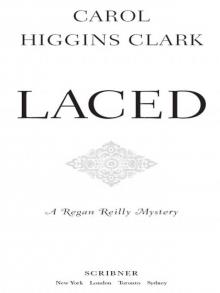 Laced
Laced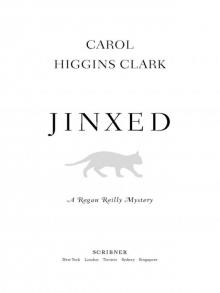 Jinxed
Jinxed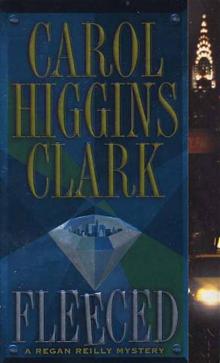 Fleeced
Fleeced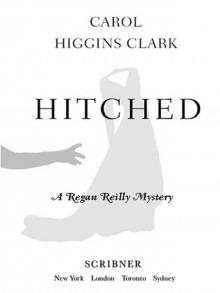 Hitched
Hitched Gypped
Gypped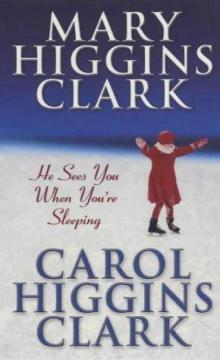 He Sees You When You're Sleeping
He Sees You When You're Sleeping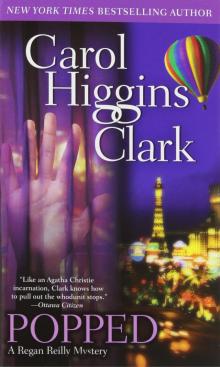 Popped
Popped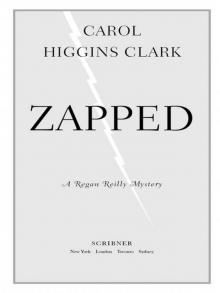 Zapped
Zapped Decked
Decked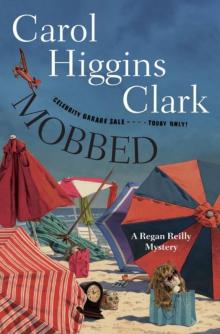 Mobbed
Mobbed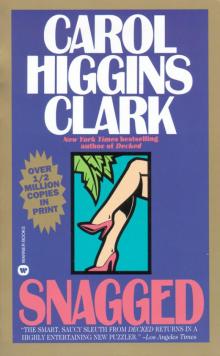 Snagged
Snagged Burned
Burned